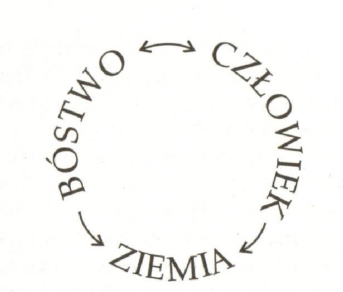From leftovers, what they have left, created by the dwarf gods. And here the work of creation was completed. People, according to Eddy, they appeared spontaneously. The gods found them lying senseless and gave them the characteristics of a conscious life.
„(…………………………………)
They found Aska and Embla lying on the shore without strength, the fate of those deprived”.
(Völuspa 11)
“They haven't been panting yet, they lacked the spirit of Rumieńce on their faces, looking fresh;
Odin gave them breath, Honir gave them the spirit,
Lodur looks and blushes”.
(Völuspa 18)
Then the descendants of Aska and Embli populated Midgard, which became the human world. Most known mythologies, the emergence of the world is associated with the sanctioning of the sense of human existence. In this case, it is possible to show a simple relationship that occurs between the earth-world, human and deity. The earth is created as the place and basis of human existence. Then the man arises, creating a deity by his mere presence. The divine being, on the other hand, sanctions its own existence and action in the protective function.
 This pattern does not appear so clearly in Scandinavian mythology. For a reader brought up in the circle of the Christian tradition, it is natural, that man is the last chronological stage in the history of the creation of the world as the most perfect divine creation. However, in the Scandinavian edition, the human being appears almost by accident and its creation is not related to the will of the deity. It should also be emphasized, that with Völuspa seems to follow, that Midgard was supposed to be made for the gods, as evidenced by the stanzas describing the Golden Age:
This pattern does not appear so clearly in Scandinavian mythology. For a reader brought up in the circle of the Christian tradition, it is natural, that man is the last chronological stage in the history of the creation of the world as the most perfect divine creation. However, in the Scandinavian edition, the human being appears almost by accident and its creation is not related to the will of the deity. It should also be emphasized, that with Völuspa seems to follow, that Midgard was supposed to be made for the gods, as evidenced by the stanzas describing the Golden Age:
“The Asians have met in the Idawell Field
And there they began to build temples and mansions.
They spared no effort, they quickly forged Pliers and tongs, tools they were making”.
(Völuspa 7)
“They were happy playing dice in the meadow;
Everything was made of pure gold with them,
Until the three giantesses came
Huge, terrible from the seat of the giants”.
(Völuspa 8)
